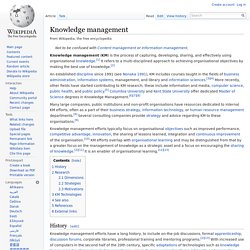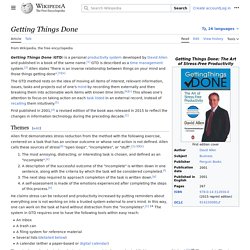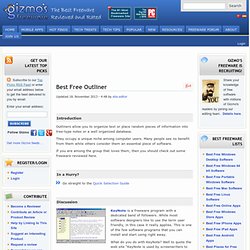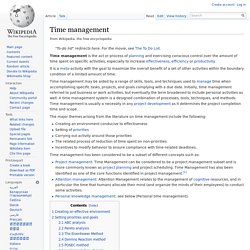

Knowledge Management. Knowledge management (KM) is the process of capturing, developing, sharing, and effectively using organizational knowledge.[1] It refers to a multi-disciplined approach to achieving organisational objectives by making the best use of knowledge.[2] An established discipline since 1991 (see Nonaka 1991), KM includes courses taught in the fields of business administration, information systems, management, and library and information sciences.[3][4] More recently, other fields have started contributing to KM research; these include information and media, computer science, public health, and public policy.[5] Columbia University and Kent State University offer dedicated Master of Science degrees in Knowledge Management.[6][7][8] History[edit] In 1999, the term personal knowledge management was introduced; it refers to the management of knowledge at the individual level.[14] Research[edit] Dimensions[edit] The Knowledge Spiral as described by Nonaka & Takeuchi.

Strategies[edit] Knowledge Plaza. Getting Things Done. The GTD method rests on the idea of moving planned tasks and projects out of the mind by recording them externally and then breaking them into actionable work items.

This allows attention to be focused on taking action on tasks, instead of recalling them.[2] First published in 2001, a revised edition of the book was released in 2015 to reflect the changes in information technology during the preceding decade. Themes[edit] Allen first demonstrates stress reduction from the method with the following exercise, centered on a task that has an unclear outcome or whose next action is not defined.
Allen calls these sources of stress "open loops", "incompletes", or "stuff".[1]:13 He claims stress can be reduced and productivity increased by putting reminders about everything you are not working on into a trusted system external to your mind. Workflow[edit] Logic tree diagram illustrating the second and third steps (process/clarify and organize) of the five-step Getting Things Done workflow. Nirvana. Cohuman. Intervals. HiTask. Tom's Planner. Student Planner - The StudyMinder Homework System School Planner.
Study Rails. VueMinder Calendar - The Best Calendar Software for Windows. Best Free Outliner. Outliners allow you to organize text or place random pieces of information into tree-type notes or a well organized database.

They occupy a unique niche among computer users. Many people see no benefit from them while others consider them an essential piece of software. If you are among the group that loves them, then you should check out some freeware reviewed here. Go straight to the Quick Selection Guide KeyNote is a freeware program with a dedicated band of followers. What do you do with KeyNote? If it is a problem for you that KeyNote is no longer under development then you might want to consider NeoMem. It's a kind of hybrid of a database and word processor that's designed to allow you to organize, store, hyperlink and search information. The bland description totally under-sells the product. As another alternative, TreeDBNotes Free can be used with full text and paragraph formatting with customizable images. Another possibility is FreeMind.
Other freeware products to be reviewed: 1.2b. Podio. Tiddlyspot. Springnote - your online notebook based on wiki. Moodle. Time management. Time management is the act or process of planning and exercising conscious control over the amount of time spent on specific activities, especially to increase effectiveness, efficiency or productivity.

It is a meta-activity with the goal to maximize the overall benefit of a set of other activities within the boundary condition of a limited amount of time. Time management may be aided by a range of skills, tools, and techniques used to manage time when accomplishing specific tasks, projects, and goals complying with a due date. Initially, time management referred to just business or work activities, but eventually the term broadened to include personal activities as well. A time management system is a designed combination of processes, tools, techniques, and methods.
Time management is usually a necessity in any project development as it determines the project completion time and scope. The major themes arising from the literature on time management include the following: Some[which?] RescueTime. Klok. ManicTime.